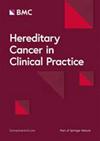Germline BRCA1 and BRCA2 mutations and the risk of bladder or kidney cancer in Poland
IF 2.4
4区 医学
Q3 ONCOLOGY
引用次数: 2
Abstract
The role of the BRCA1 and BRCA2 genes in bladder and renal tumorigenesis is unclear. Our goal was to determine the prevalence of specific founder mutations genes BRCA1 (5328 insC, C61G and 4153 delA) and BRCA2 (C5972T) mutations in bladder and kidney cancer patients from Poland. We genotyped 1028 patients with bladder cancer and 688 cases with kidney cancer and two control groups. A BRCA1 mutation (all variants combined) was detected in peripheral blood leukocytes in 5 out of 1028 (0.5%) bladder cases and in 17 of 4000 controls (0.4%) (odds ratio [OR], (OR = 1.1; 95% CI 0.42–3.11; p = 1.0). Among 688 unselected kidney cancer cases a BRCA1 mutations was reported in three patients (0.4%) (OR = 1.0; 95% CI 0.29–3.51; p = 1.0). The mutation C5972T in BRCA2 was observed in 54 bladder cancer patients (5.2%) and in 159 of 2791 healthy controls (5.7%) (OR = 0.9; 95% CI 0.66–1.26; p = 0.6). Fifty kidney cancer cases carried a BRCA2 mutation (7.3%) (OR = 1.3; 95% CI 0.93–1.80; p = 0.1). In conclusion, we found no difference in the prevalence of BRCA1 and BRCA2 founder mutations between cases and healthy controls. The mutations BRCA1 and BRCA2 seem not to play a role in bladder and kidney cancer development in Polish patients.波兰生殖系BRCA1和BRCA2突变与膀胱癌或肾癌的风险
BRCA1和BRCA2基因在膀胱和肾脏肿瘤发生中的作用尚不清楚。我们的目标是确定波兰膀胱癌和肾癌患者中特定始创突变基因BRCA1 (5328 insC, C61G和4153 delA)和BRCA2 (C5972T)突变的患病率。我们对1028例膀胱癌患者和688例肾癌患者以及两个对照组进行了基因分型。1028例膀胱患者中有5例(0.5%)外周血白细胞检测到BRCA1突变(所有变异组合),4000例对照中有17例(0.4%)(优势比[OR], (OR = 1.1;95% ci 0.42-3.11;p = 1.0)。在688例未选择的肾癌病例中,有3例(0.4%)报告了BRCA1突变(OR = 1.0;95% ci 0.29-3.51;p = 1.0)。在54例膀胱癌患者(5.2%)和2791名健康对照者(5.7%)中观察到BRCA2突变C5972T (OR = 0.9;95% ci 0.66-1.26;p = 0.6)。50例肾癌患者携带BRCA2突变(7.3%)(OR = 1.3;95% ci 0.93-1.80;p = 0.1)。总之,我们发现病例和健康对照之间BRCA1和BRCA2创始人突变的患病率没有差异。突变BRCA1和BRCA2似乎在波兰患者的膀胱癌和肾癌发展中不起作用。
本文章由计算机程序翻译,如有差异,请以英文原文为准。
求助全文
约1分钟内获得全文
求助全文
来源期刊
CiteScore
3.10
自引率
5.90%
发文量
38
审稿时长
>12 weeks
期刊介绍:
Hereditary Cancer in Clinical Practice is an open access journal that publishes articles of interest for the cancer genetics community and serves as a discussion forum for the development appropriate healthcare strategies.
Cancer genetics encompasses a wide variety of disciplines and knowledge in the field is rapidly growing, especially as the amount of information linking genetic differences to inherited cancer predispositions continues expanding. With the increased knowledge of genetic variability and how this relates to cancer risk there is a growing demand not only to disseminate this information into clinical practice but also to enable competent debate concerning how such information is managed and what it implies for patient care.
Topics covered by the journal include but are not limited to:
Original research articles on any aspect of inherited predispositions to cancer.
Reviews of inherited cancer predispositions.
Application of molecular and cytogenetic analysis to clinical decision making.
Clinical aspects of the management of hereditary cancers.
Genetic counselling issues associated with cancer genetics.
The role of registries in improving health care of patients with an inherited predisposition to cancer.

 求助内容:
求助内容: 应助结果提醒方式:
应助结果提醒方式:


